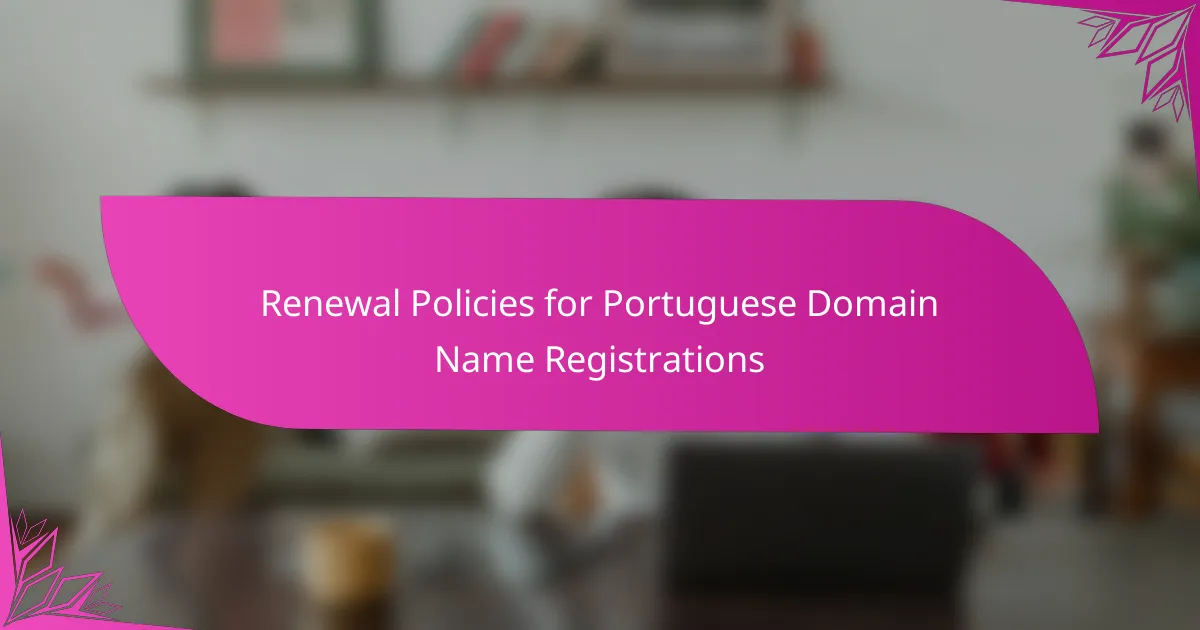Renewing a Portuguese domain name is a straightforward process that can be accomplished through various methods, such as online, via email, or over the phone. It is crucial to renew your domain before it expires to maintain ownership and prevent downtime for your website. The renewal policies for .pt domains include a standard renewal period, a grace period for late renewals, and potential penalties for late action.
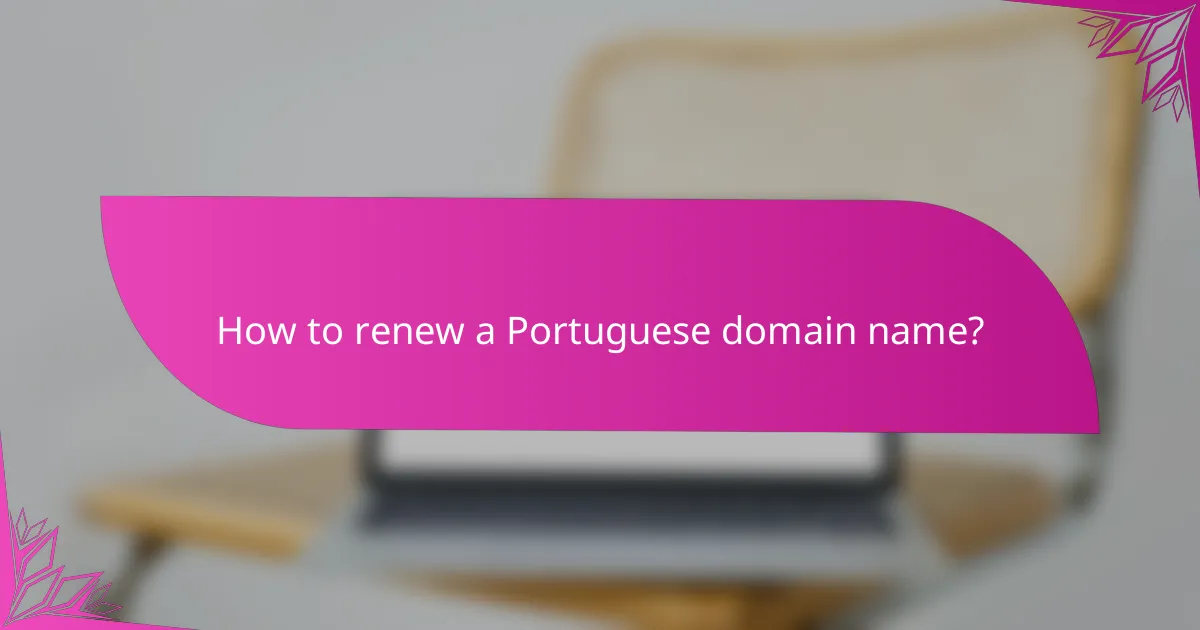
How to renew a Portuguese domain name?
Renewing a Portuguese domain name is a straightforward process that can be done through various methods, including online, via email, or over the phone. It’s essential to renew your domain before it expires to avoid losing ownership and potential downtime for your website.
Online renewal through registrars
The most common way to renew a Portuguese domain name is through your registrar’s online platform. Log in to your account, navigate to the domain management section, and select the domain you wish to renew. Most registrars offer a simple renewal process that can be completed in just a few clicks.
Typically, renewal fees range from €10 to €30 per year, depending on the registrar and the domain extension. Ensure that your payment method is up to date to avoid any interruptions during the renewal process.
Renewal via email request
If you prefer a more traditional approach, you can request a renewal via email. Contact your registrar’s customer support and provide your domain name, account details, and any necessary identification. This method may take longer than online renewal, so plan accordingly.
Be sure to follow up if you do not receive a confirmation within a few days. Keep a record of your email correspondence for reference, especially if there are any issues with the renewal.
Phone renewal with customer support
Another option for renewing your domain is to call your registrar’s customer support. This method allows you to speak directly with a representative who can assist you through the renewal process. Have your account information and domain details ready to expedite the call.
Phone renewals may incur additional fees, so inquire about any potential costs during the call. This method is beneficial if you have specific questions or need assistance with complex renewal situations.
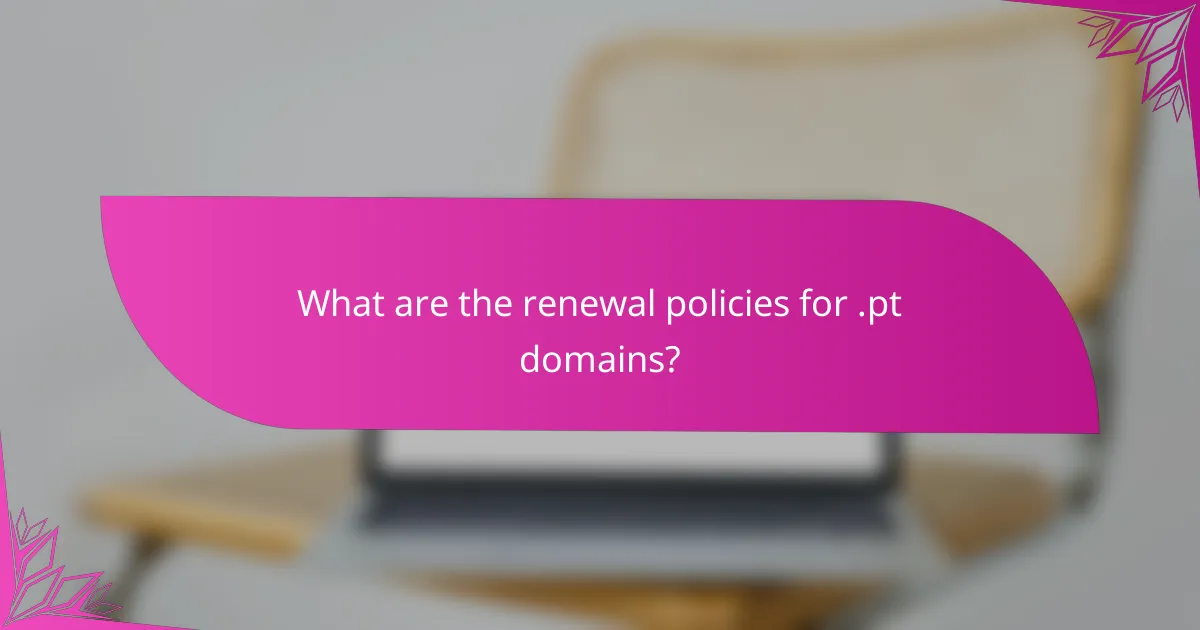
What are the renewal policies for .pt domains?
The renewal policies for .pt domains are designed to ensure that domain owners can maintain their registrations without interruption. Typically, these policies include a standard renewal period, a grace period for late renewals, and potential penalties for failing to renew on time.
Standard renewal period
The standard renewal period for .pt domains is usually set at one year. Domain owners can renew their registrations up to 30 days before the expiration date to avoid any service interruptions. It is advisable to set reminders for renewal to ensure timely action.
Grace period details
After the standard renewal period ends, there is typically a grace period of about 30 days during which the domain can still be renewed without incurring penalties. During this time, the domain remains active, but the owner should act quickly to avoid losing the domain. Notifications are often sent to remind owners of the impending expiration.
Late renewal penalties
If a domain is not renewed by the end of the grace period, it may enter a redemption phase, which can incur additional fees. These fees can vary, but they are generally in the range of €50 to €100, depending on the registrar. It is crucial to renew the domain within the grace period to avoid these extra costs and potential loss of the domain.
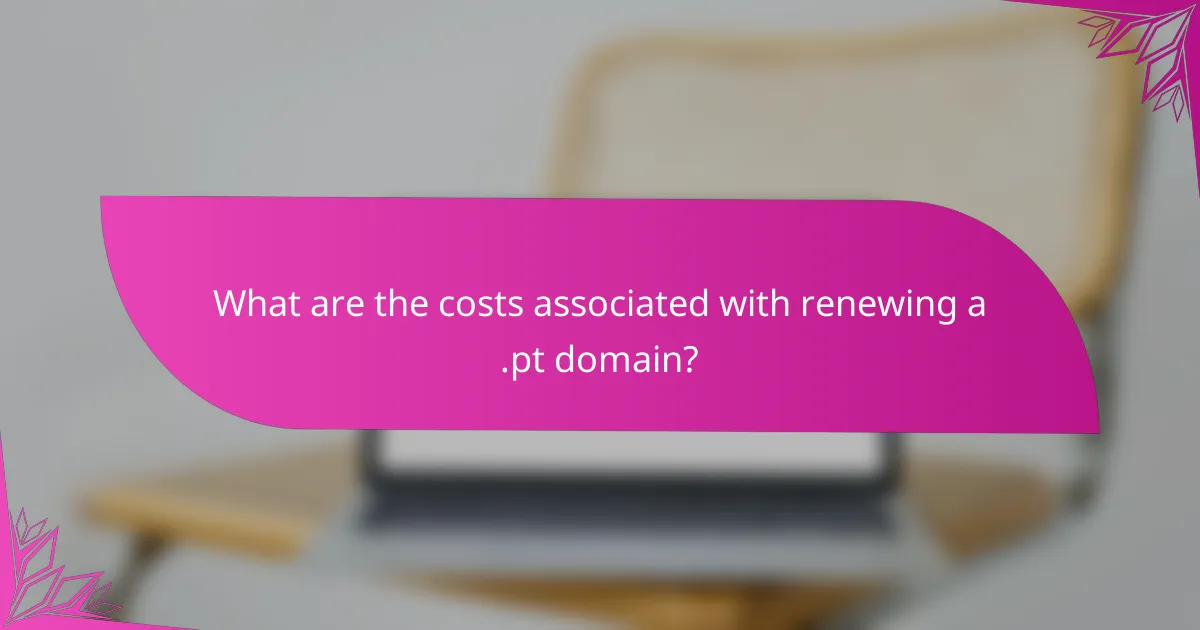
What are the costs associated with renewing a .pt domain?
Renewing a .pt domain typically involves various costs, primarily the registrar fees, which can vary based on the provider. These fees usually range from around €10 to €30 per year, depending on the registrar and any additional services included.
Registrar fees comparison
Registrar fees for .pt domain renewals can differ significantly among providers. For example, some registrars may charge a basic fee of €10, while others may offer premium services that can raise the cost to €30 or more. It’s essential to compare these fees to find the best value for your needs.
When evaluating registrars, consider not only the renewal price but also any additional features, such as privacy protection or customer support, which can enhance the overall value of the service.
Discounts for long-term renewals
Many registrars offer discounts for long-term renewals of .pt domains. For instance, opting for a two or three-year renewal can often result in a lower annual rate compared to a single-year renewal. Discounts can range from 10% to 20%, making it financially beneficial to commit for a longer period.
Before renewing, check if your registrar has any promotional offers or loyalty programs that could further reduce costs for long-term commitments.
Currency considerations for international payments
When renewing a .pt domain from outside Portugal, be mindful of currency conversion fees. Most registrars accept payments in euros (EUR), so if you’re using a different currency, your bank or payment provider may charge additional fees for conversion.
To avoid unexpected costs, consider using a payment method that offers favorable exchange rates or low fees for international transactions. Always check the total amount charged in your local currency before finalizing the payment.
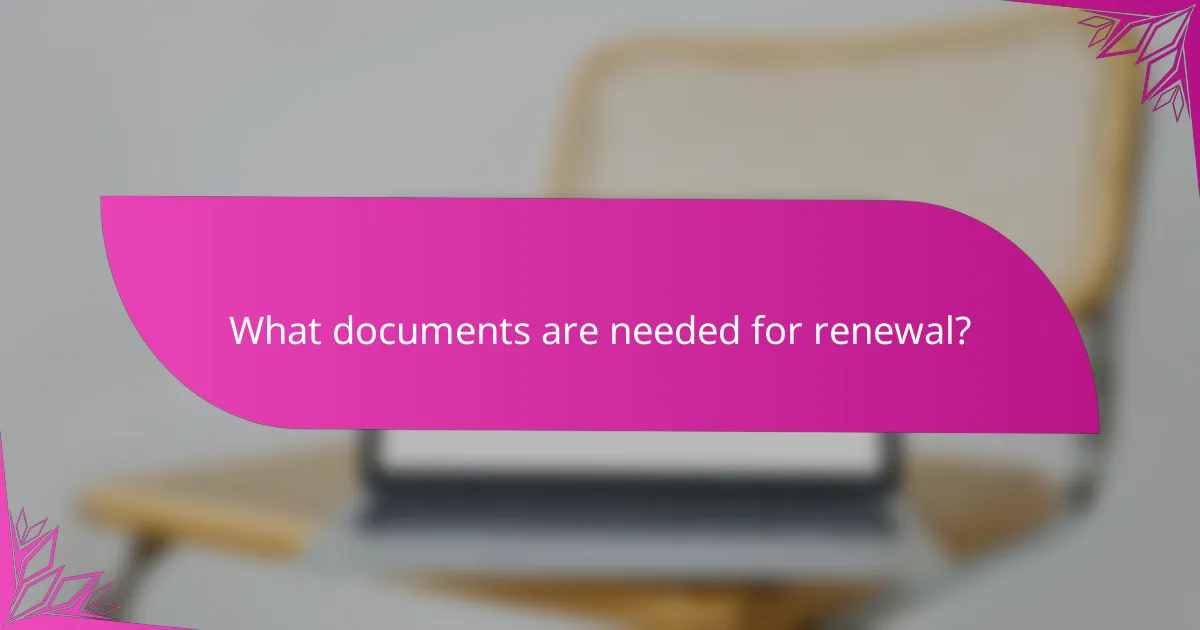
What documents are needed for renewal?
To renew a Portuguese domain name, you typically need to provide proof of identity, business registration documents if applicable, and authorization letters for third-party renewals. Ensuring you have the correct documentation is essential to avoid delays in the renewal process.
Proof of identity requirements
Individuals renewing a domain must submit valid identification, such as a passport or national ID card. This document verifies the identity of the registrant and must be current and legible.
For businesses, a representative may need to provide their identification along with proof of their position within the company, such as a corporate ID or a letter from the company confirming their authority to act on behalf of the business.
Business registration documents
Businesses must present official registration documents, such as a certificate of incorporation or a business license. These documents confirm the legal status of the entity and its right to operate under its registered name.
Depending on the nature of the business, additional documentation may be required, such as tax identification numbers or proof of compliance with local regulations. Always check with your registrar for specific requirements.
Authorization letters for third-party renewals
If a third party is handling the renewal on behalf of the registrant, an authorization letter is essential. This letter should clearly state that the third party has permission to manage the renewal process.
The authorization letter should include details such as the domain name, the registrant’s information, and the third party’s contact details. It is advisable to keep a copy of this letter for your records and to ensure it is signed by the registrant.
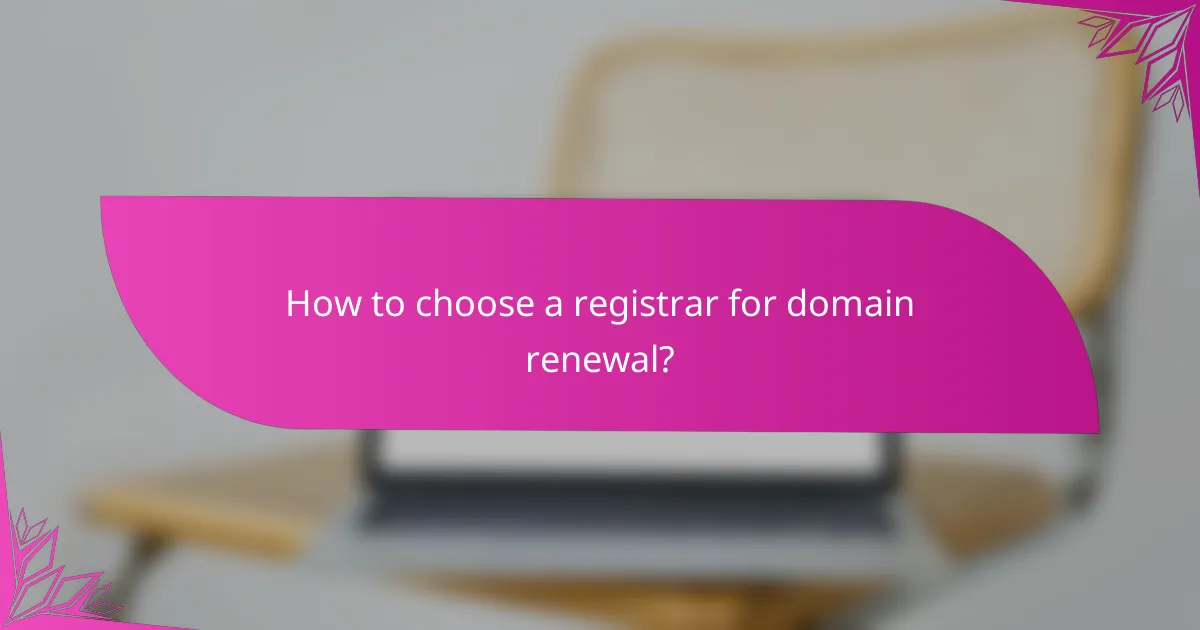
How to choose a registrar for domain renewal?
Choosing a registrar for domain renewal involves evaluating their reputation, customer support, and pricing transparency. A reliable registrar will help ensure your domain remains active without unexpected issues.
Reputation and reliability
When selecting a registrar, consider their reputation in the industry. Look for registrars with a long-standing history and positive reviews from users, as this often indicates reliability.
Check for any complaints regarding service interruptions or issues with domain transfers. A registrar with a solid track record is less likely to cause problems during the renewal process.
Customer support quality
Effective customer support is crucial when renewing a domain. Ensure the registrar offers multiple channels for assistance, such as phone, email, and live chat.
Evaluate their support availability, especially if you need help during non-business hours. A registrar with 24/7 support can be invaluable if you encounter urgent issues.
Pricing transparency
Transparent pricing is essential when choosing a registrar for domain renewal. Look for clear information on renewal fees, including any potential increases after the first year.
Some registrars may offer promotional rates that increase significantly upon renewal. Always read the fine print to avoid unexpected costs and ensure you understand the total fees involved.
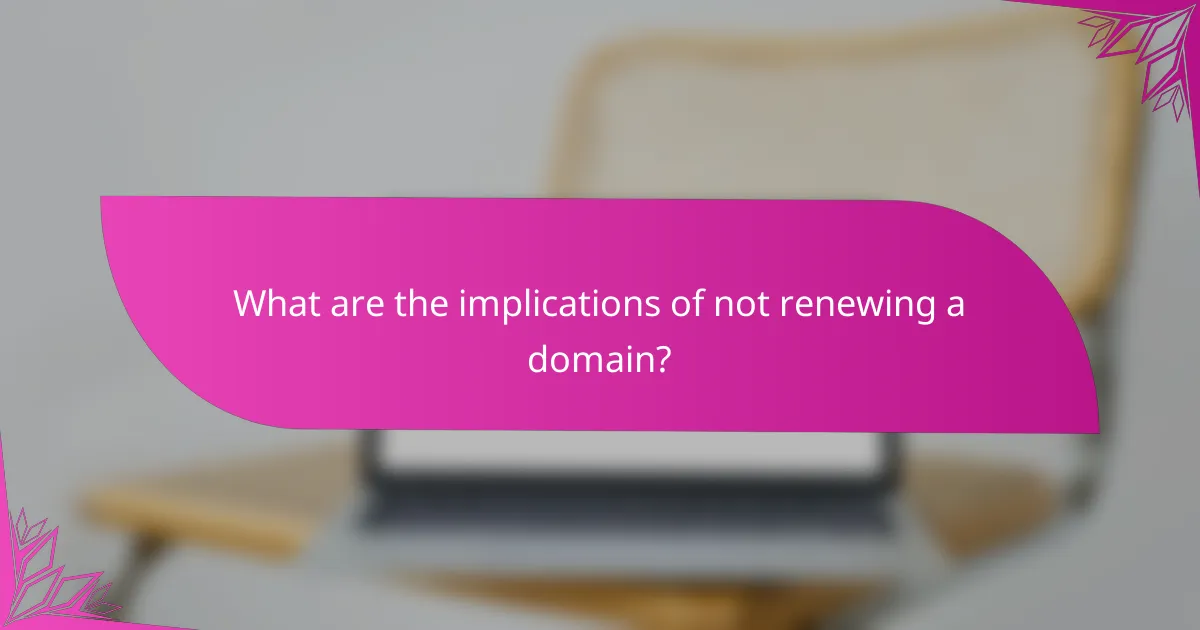
What are the implications of not renewing a domain?
Failing to renew a domain can lead to significant consequences, including loss of ownership and potential financial loss. Once a domain expires, it may become available for registration by others, which can disrupt your online presence and brand identity.
Loss of Ownership
When a domain registration lapses, the original owner loses all rights to that domain. This means that anyone can register it, potentially leading to competitors or malicious actors acquiring it. If your domain is critical for your business, this can result in a direct loss of customers and revenue.
Impact on SEO and Brand Reputation
Not renewing a domain can severely impact your search engine rankings. Search engines may de-index your website, making it harder for customers to find you online. Additionally, if someone else registers your domain, they could use it to misrepresent your brand, damaging your reputation.
Financial Consequences
The financial implications of not renewing a domain can vary. You may face costs associated with regaining the domain if it is still available, which can range from a few dozen to several hundred euros, depending on demand. In some cases, you may need to invest in a new domain entirely, which can incur additional costs for rebranding and marketing.
